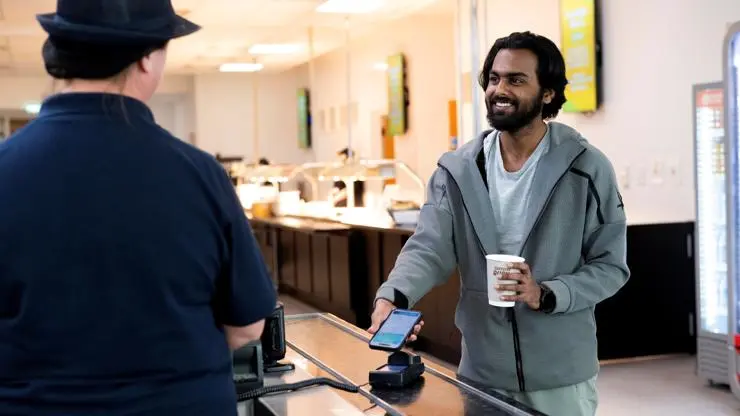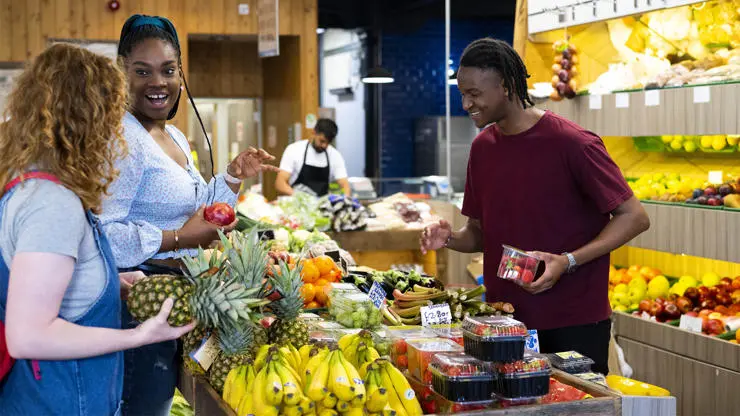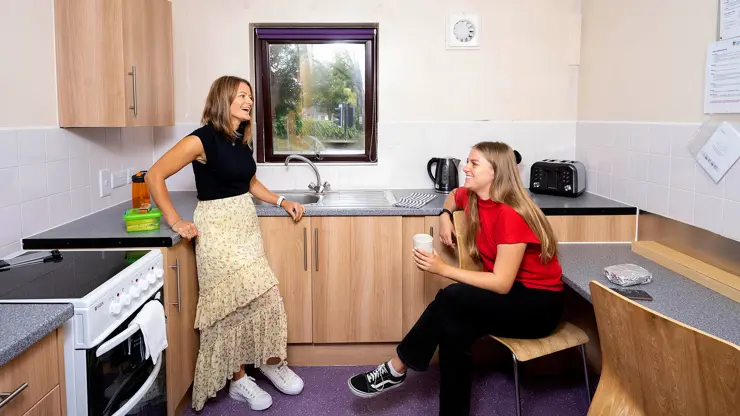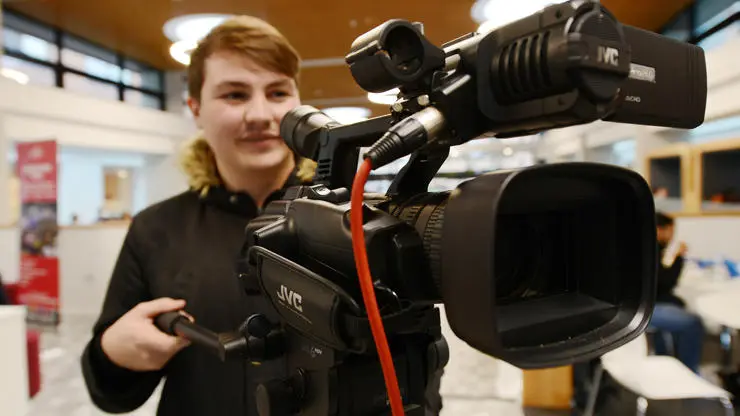
1. Create a monthly budget
The first step to staying on top of your finances is to create a realistic budget. This doesn’t just mean knowing how much money you have. It also involves understanding how long it needs to last and what you need to spend it on. Your student finances needs to last the entire year, and it’s important to make sure it’s managed well.
This is where a good student budget can help. Having a budget will make it easier to avoid overspending.. If you can take it a step further and cultivate healthy saving habits, you give your budget plan the best possible chance of working.
If you need help with your budgeting, you can check out our guide to budgeting at university.
2. Open a student bank account
A student bank account can also help you save money. Lots of student bank accounts offer perks like travel cards, vouchers or discounts. The key is to make sure they’re things you’ll actually use.
Other student bank accounts may offer cash incentives like £100 if you choose them. Make sure to calculate if you'll actually save more in the long run by choosing a student bank account with a higher interest rate or travel card.
Lastly, you should always read the small print. Avoid making any big money-related decision in haste. You should always take your time to look for hidden fees or complicated terms and conditions.
When opening your account, remember to bring the right ID (proof of student status is essential). Don’t feel pressured into taking additional products like credit cards.

3. Plan your meals and cook at home
Takeaways and meals out can start to get expensive very quickly. Planning your meals and cooking at home can help you save money. You can find quick and easy student recipes on YouTube and TikTok. There are lots of recipes out there to suit your taste and diet requirements. It's also helps you pick up a new life skill and is a good way to ensure you’ll use what you buy.
4. Write a shopping list
An easy way to save money as a student is by simply writing a shopping list. Once you've planned your meals for the week, you'll know exactly what you need to buy at the supermarket. This reduces impulse buys and food waste. No more spending money on food that goes straight in the bin.
5. Swap Supermarkets
Swap supermarkets to get better value for money. There are lots of places to buy food in Preston. These range from large superstores to smaller convenience stores. If you know where to go, you can do your weekly shop from as little as £30.
As a student you can find a lot of budget-friendly prices and deals at larger supermarkets like Lidl, Aldi or Morrisons. Whereas smaller stores can cost more in the long run.
If you're not in the mood for shopping, you can also check out TooGoodToGo. They offer 'Magic Bags' you can buy, filled with unsold items from that day, making it a surprise until you collect it. These items are close to their best-before or use-by date, meaning you get them at a fraction of their usual price.
6. Make your meals in bulk
Batch cooking is another great way to cut down on time and money spent on weekly grocery shopping. Not only is it great if you’re short on time during the week, but it also allows you to use up several ingredients all at once.
Having pre-made meals means you’ll always have something ready to eat when you need it. Leftovers can be used as quick weekday lunches, and most campuses have microwaves for easy reheating.
7. Best-before vs use-by
A lot of food goes to waste because students assume it has gone bad when it is still perfectly edible. This is where a little know-how can help you save money. A good starting point is to know the difference between best-before and use-by dates.
Many people mistakenly believe that food is unsafe to eat once it’s past its best-before date. In reality, that date is simply a guideline for when the product is at its best quality. Often, the food is still perfectly good to eat afterwards.
The key is to trust your senses - if it looks and smells fine, it’s probably safe. As a rule of thumb, most foods are still okay a few days past their best-before date.
Here's a summary of the difference between best-before and use-by dates:
- Best-before date: indicates quality, not safety. Eating food after this date is usually safe.
- Use-by date: A safety measure for perishable, high-risk foods like meat, fish, and dairy. After this date, the risk of foodborne illness increases, so it’s better to discard them.
8. Store your food correctly
If you want to reduce how much you’re throwing away, then you can simply store them correctly. Many foods can be frozen, from bread to chopped vegetables. Just make sure to freeze them before they go bad.
Some other ways to reduce your food waste include:
- Leftover recipes - you can use recipe apps and websites like DishGen which suggest recipes based on what you already have at home.
- Buy loose fruit and veg - buying single pieces of fruit and veg means you only buy what you need and cuts down on unnecessary packaging.
- Meal plan challenges - joining online meal plan challenges can help you use up what’s already in your cupboards and fridge, cutting your food spend even further.
- Share unwanted food - give away food you know you won’t eat or use. You can use apps like Olio to give away unwanted food or donate it to a local food banks.
9. Shop at night
If you’re looking for a way to get your food shop even cheaper, always look out for yellow stickers with reduced prices. Lots of stores reduce the price of products that are close to their best-before or use-by date. By shopping at night, you can buy food that's about to go off for less.
You’ll also find lots of promotions at certain periods like Christmas or Easter. Get your chocolate cheaper by shopping just after the festive period.
10. Get your food cheap on campus
You can also take advantage of the various deals on offer at the university cafes and restaurants. Our student union café for example, offers a wide selection of food and drinks at great prices, including Preston’s cheapest meal deal at £2.99. You also get access to a 20% discount on all items, already built into the pricing.

11. Compare energy and broadband providers
Utilities can take up a large chunk of your student budget, so it pays to stay on top of them. It’s good practice to shop around for the best energy or broadband provider. Do your research and check if you're on the best deal for energy, broadband and water. Don’t just stick with the previous tenant's provider - there might be much better deals out there for new customers.
12. Warm spaces on campus
You can save money in winter by turning off your heating and studying at one of our warm spaces on campus. Our Preston Campus library ground floor is open 24/7 during term time. Our Student Centre also has a variety of spaces to relax, study or socialise. Save money by bringing your own food and using our microwaves, hot water and water fountains across campus.
- Most campus buildings are open Monday–Friday, 7.30am–9.00pm
- The Preston Campus Library is open 24/7 during term time (hours vary outside term)
- The Student Centre is open 8am – 9pm (Monday to Friday), 10am – 6pm (Saturday and Sunday).

13. Free access to software and specialist equipment
As a student you get free access to the Microsoft 365 suite on or off campus. This includes essential software like Word, PowerPoint and Excel. You can also get access to the Adobe Creative Suite, which includes industry-standard software like InDesign, Illustrator and Photoshop.
We also have lots of specialist tech equipment which you can borrow for your course, like cameras and microphones. If you need to buy essential equipment, you’ll normally be able to find it at a super affordable price through our University Achieve portal. You can purchase everything from stationery to books to air fryers and audio equipment via the portal.
14. Free events
The Students’ Union offers lots of free opportunities to have fun, meet new people and try new things. They also run regular ‘Give It a Go’ activities so you can try something new for free. You can also join more than 70 societies and sports clubs at an affordable price. Visit their website to discover what’s coming up.
15. Learn a language for free
At our Worldwise Learning Centre you can access a wealth of free resources to help you learn another language, including the popular Rosetta Stone software. Various languages are available to learn through self-study – from Arabic to Chinese (Mandarin), French to Korean – take your pick from 24 languages.
16. Buy textbooks, clothes, furniture, and technology second-hand
Buying second-hand is a smart, sustainable and budget-friendly way to save money on just about anything you might need during your time at university – whether it’s textbooks, clothes, furniture or household essentials.
When looking for books, don’t stop at Amazon’s used listings. Sites like eBay, AbeBooks and the Book Depository also offer great deals on second-hand textbooks and general reading.
Charity shops are another excellent option for finding bargains. You can often snap up great-quality items at low prices online or at local charity shops, such as British Heart Foundation, Shelter, Derian House and Emmaus.
If you're looking for technology to help you with your studies, such as a laptop or a monitor, then you can get a much better deal with second-hand, recycled and refurbished models. We've partnered with RecycleIT to bring our students deeply discounted offers on recycled laptops, monitors, Macs and more. Each purchase also comes with one-year warranty for peace-of-mind during your studies.
You could also sell your unwanted items once you are finished with them.
17. Be money-smart with your mobile bill
Want to know how to save money on your phone bill? A good starting point is to make sure you’re on the right tariff for your actual usage. Check your last few bills to see how much data, calls, and texts you usually use, then find the cheapest contract that matches it.
If you’re happy with your current network, don’t assume that you’re stuck paying the same price. Near the end of your contract, call your provider and ask if there are any better deals.
Another good option to consider is going SIM only. Instead of paying for a pricey new handset bundled into a contract, keep your existing phone and switch to a SIM-only deal. These plans are often far cheaper, with shorter contracts and more flexibility – perfect for students on a budget.
And if you really want to keep costs down, pay-as-you-go bundles now offer excellent value and give you complete control over what you spend.
18. Stay fit and get rewarded
Save money by walking or cycling to campus if you live nearby. Both are free, healthy and often quicker than commuting. Cycling in particular is a great long-term saver, and the Students Union provides a Bike Hire scheme to make getting around our Preston campus easier.
Better yet, you can get various rewards by downloading the MOVES+ app. It turns your everyday movement into points that you can swap for rewards, from free coffees to hoodies and more. It’s a brilliant way to save money while keeping fit.
